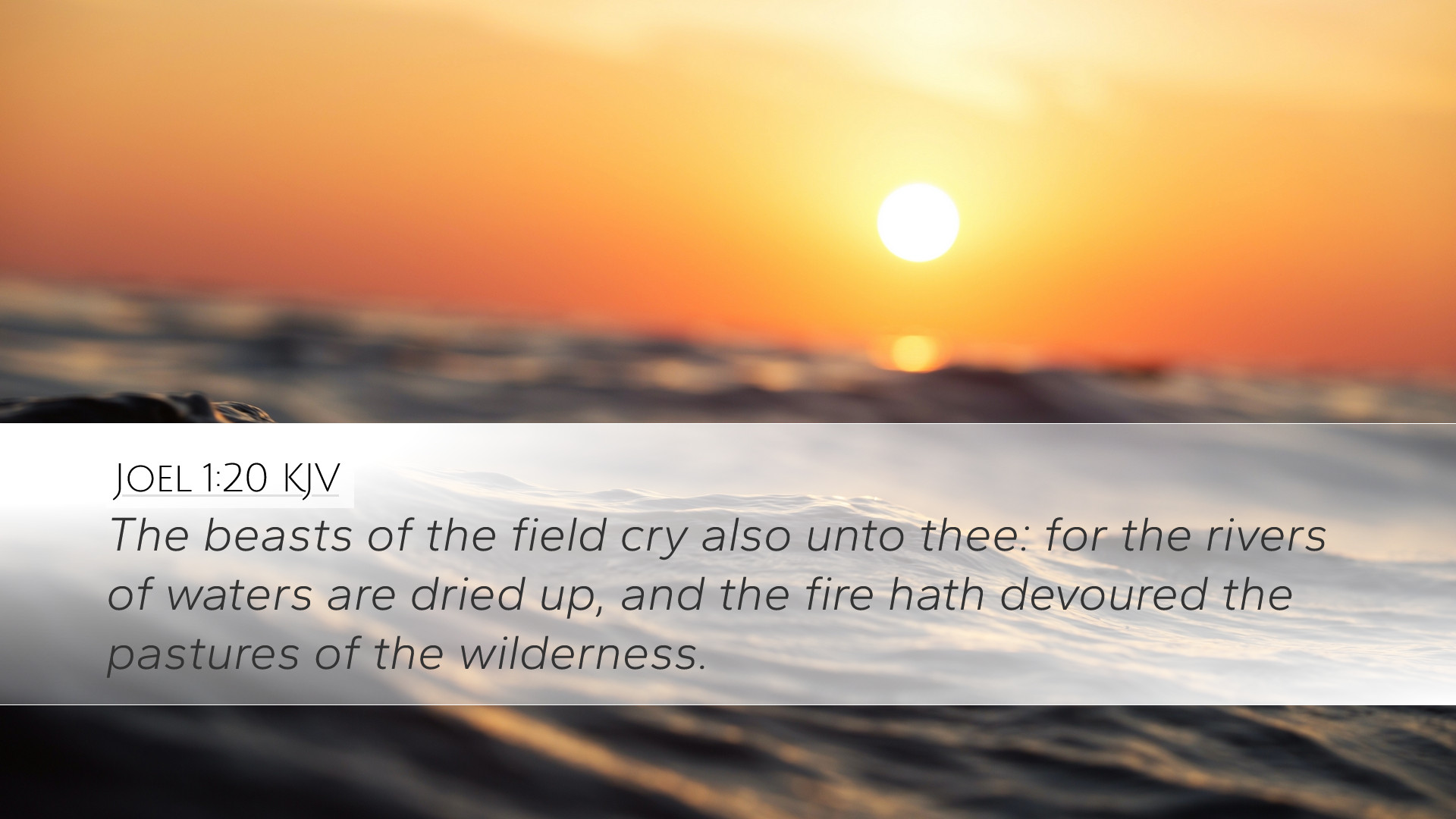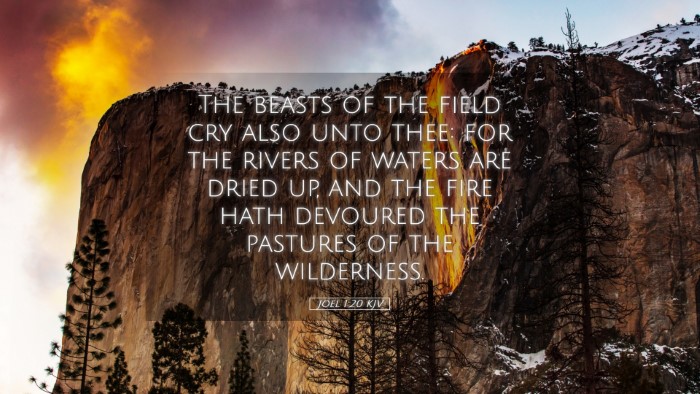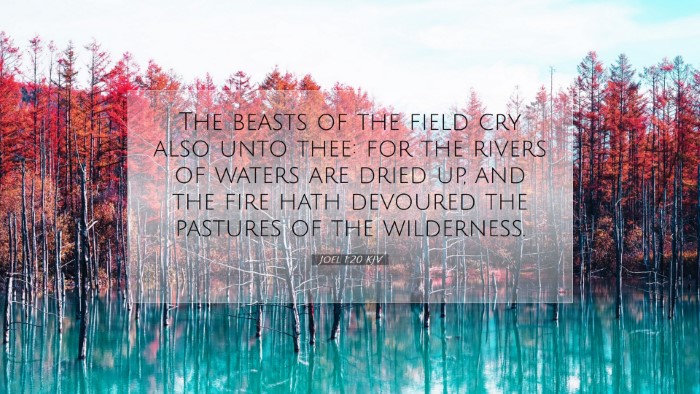Old Testament
Genesis Exodus Leviticus Numbers Deuteronomy Joshua Judges Ruth 1 Samuel 2 Samuel 1 Kings 2 Kings 1 Chronicles 2 Chronicles Ezra Nehemiah Esther Job Psalms Proverbs Ecclesiastes Song of Solomon Isaiah Jeremiah Lamentations Ezekiel Daniel Hosea Joel Amos Obadiah Jonah Micah Nahum Habakkuk Zephaniah Haggai Zechariah MalachiJoel 1:20
Joel 1:20 KJV
The beasts of the field cry also unto thee: for the rivers of waters are dried up, and the fire hath devoured the pastures of the wilderness.
Joel 1:20 Bible Commentary
Commentary on Joel 1:20
Joel 1:20 states:
"The beasts of the field cry also unto thee: for the rivers of waters are dried up, and the fire hath devoured the pastures of the wilderness."
Introduction
The verse presents a vivid picture of desolation and loss experienced by both land and the creatures dwelling within it. The context of the verse is essential for understanding the prophetic message of Joel regarding the locust plague and its implications for Israel.
Contextual Analysis
The Book of Joel is a prophetic book that deals with the themes of judgment and restoration. Joel prophesies about the devastation brought upon the land, revealing both the physical and spiritual ramifications of sin. The imagery in this verse serves to highlight the seriousness of the situation, where even the beasts of the field cry out in distress.
Insights from Public Domain Commentaries
Matthew Henry
Matthew Henry emphasizes the cry of the beasts as indicative of the universal nature of the suffering caused by divine judgment. He notes that "the animals, which are innocent of the sins of the people, share in their calamities." This reflects the interconnectedness of creation and highlights God's concern not only for humanity but also for the entire ecosystem.
Albert Barnes
Albert Barnes provides a deeper exploration of the circumstances leading to the drought and fire mentioned in this verse. He explicates that this judgment is a direct consequence of the people's unfaithfulness and disobedience to God. Barnes writes, "This calamity is a type of the spiritual desolation that follows sin, illustrating how the natural world is affected by human actions." His commentary draws attention to the implication that sin can bring about both spiritual and physical destruction.
Adam Clarke
Adam Clarke offers a theological perspective on the significance of the fire and drought. He points out that the devastation of the land and the cries of the animals serve as a metaphor for the loss of God’s favor and the withdrawal of His blessings from the people. Clarke notes that "the barrenness of the soil is often representative of the barrenness of the human soul when separated from God." In this, he invites readers to reflect on the deeper spiritual truths that underline Israel's plight.
Theological Implications
Joel 1:20 holds significant theological implications. The verse serves to remind readers of God's sovereignty over creation and the impact of human sin on the environment. It paints a picture of a world crying out for redemption. Here, the voice of creation echoes the need for repentance and restoration.
- The Sovereignty of God: God’s control over nature underscores His power and authority. The drought and fire are not mere accidents but manifestations of divine judgment.
- Human Responsibility: The lament of the beasts implies that human actions affect the broader world. The state of the environment reflects the moral and spiritual state of humanity.
- Hope of Restoration: Despite the desolation, the cry of creation points towards a longing for restoration, which is a central theme in the prophetic literature.
Application for Believers
For pastors, students, theologians, and Bible scholars, Joel 1:20 serves as a potent reminder of the intimate link between our faith, our actions, and the world around us. The implications extend beyond just the context of the locust plague in ancient Israel and encourage believers to consider:
- Environmental Ethics: The suffering of the land and the animals invites believers to reflect on their stewardship of creation and the responsibility to care for the Earth.
- Spiritual Vigilance: The spiritual desolation represented by the judgment calls believers to remain alert and faithful to God's covenant, recognizing that unfaithfulness leads to broader societal and ecological consequences.
- Call to Action: This verse can motivate believers to advocate for societal change and environmental justice as they seek to embody Christ's compassion for all of creation.
Conclusion
In summary, Joel 1:20 serves as a rich text for understanding the intertwining of divine judgment and mercy. The cries of the beasts symbolize a longing for restoration and a reminder of humanity’s connectedness with creation. The insights from various commentators encourage an exploration of the implications of sin, the importance of stewardship, and the hope offered through repentance and God's intervention.


